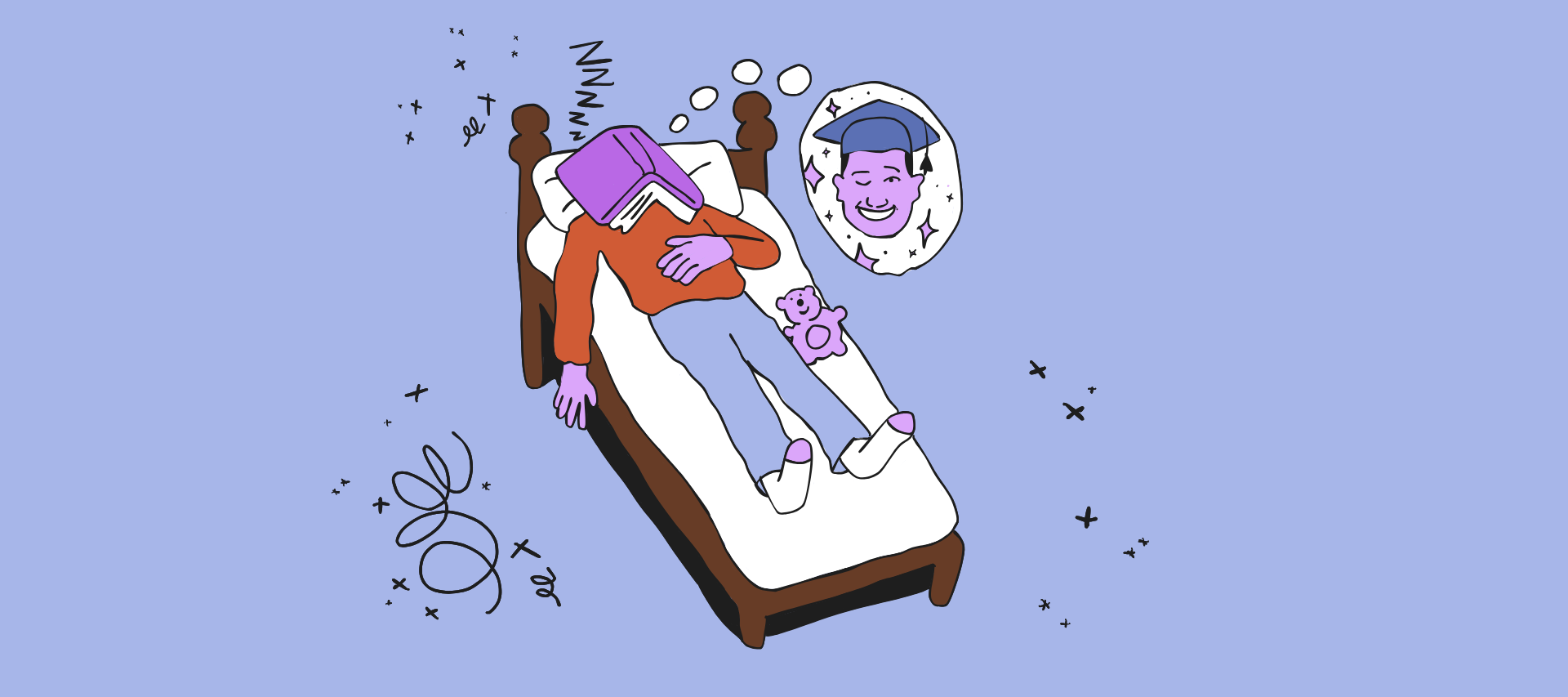Restful sleep helps improve your learning.
But how can you determine how much sleep you need? According to Matthew Walker, professor of neuroscience and psychology at the University of Berkeley and author of Why We Sleep, the indicators of a good night's sleep are:
- not needing coffee in the morning
- and not going back to sleep after waking up.1
We highly recommend reading this book. Matt also has a podcast, The Matt Walker Podcast, which is worth checking out if you have some time to spare.
In this article, we provide you with the keys to understanding how good sleep enables you to learn, revise, and retain information more effectively.

Understanding Sleep to Optimize It
Sleep is often overlooked in learning strategies (INSERT LINK) (hello, all-nighters to study for exams), even though it plays an essential role in memory, concentration, and mental recovery.
To learn better, you don't need to work harder; you need to sleep better.
What Are the Stages of Sleep and What Are They For?
Sleep is not linear. It is divided into cycles of about 90 minutes, each comprising several stages:
Light Sleep (Stages N1 & N2):
- Transitional phase between wakefulness and deep sleep
- The brain slows down, muscles relax
- Serves to prepare the body for deeper sleep
Deep Sleep (Stage N3):
- Very low brain activity
- This is the most restorative phase in physical terms
- Crucial for recover, the immune system, and the consolidation of factual information
REM Sleep:
- Intense brain activity, similar to wakefullness
- This is the phase of dreaming, but also of emotional and procedural memory consolidation
- Plays an important role in creativity and learning integration
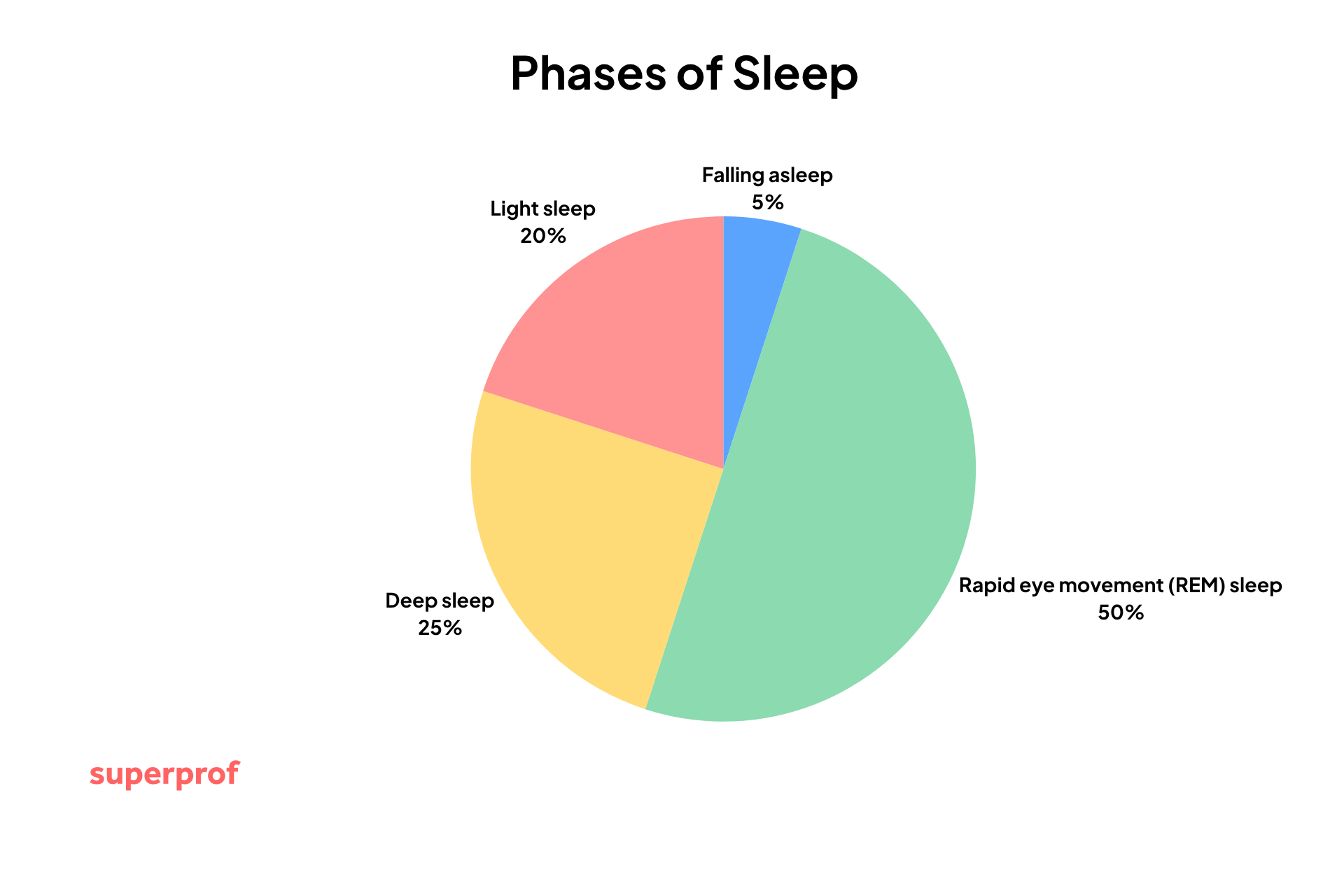
Every night, we alternate between several complete cycles. The quality of sleep therefore depends not only on its duration, but also on the proper sequence of these phases.
Why Does Sleeping Well Improve Learning?
The link between sleep and learning has now been widely proven by research. Sleep works on several levels:
Memory Consolidation2:
During deep and REM sleep, the brain replays and reinforces connections formed during the day. This applies to both declarative3 memory (facts, concepts) and procedural memory (gestures, routines).
Sorting Information4:
The brain eliminates unnecessary data and reinforces the most relevant information.
This process allows us to structure knowledge.
Preparing for Future Learning:
A good night's sleep improves concentration, alertness, and brain plasticity the next day, making it easier to learn new skills.
Sleep is therefore not only for recovery, it plays an essential role in memory consolidation, concentration, and the ability to assimilate knowledge for better learning, revision, and retention.
Sleeping well will help you retain information better and learn faster.
of learning capacity according to Walker.1
Implementing these tips requires a little discipline, but keep in mind that they will help you develop good habits.
You may have heard that it takes 21 days to form a new habit.
However, researchers at University College London have found that it actually takes 66 days, with the range being between 18 and 264 days, or less than a year.5 If you've made up your mind and want to give yourself the best chance of learning, remember that the first year is crucial.
Adopt the Right Habits to Improve Your Sleep
To improve the quality of your sleep, it's not enough to just try to sleep.
It also involves adopting daily habits that promote sleep and regular sleep cycles.
Tip #1: Eat Smart to Sleep Better
What you put on your plate can have a direct impact on your sleep. Some foods promote the production of melatonin (the sleep hormone) or calm the nervous system, while others can delay sleep or cause nighttime awakenings.

For example, did you know that half of the caffeine you consume is still in your body six hours later? This means that when you drink coffee in the afternoon, the caffeine will still be in your system when you go to bed. And with caffeine in your system, your night's sleep won't be as restful as it should be.
✅ Foods to Favor in the Evening
- Sources of tryptophan6 (an amino acid precursor of serotonin and then melatonin): eggs, milk, turkey, bananas, walnuts, almonds, etc.
- Complex carbohydrates: brown rice, whole-grain pasta, legumes (promote the availability of tryptophan)
- Relaxing herbal teas: chamomile, lime blossom, verbena, etc.
- Foods rich in magnesium: spinach, almonds, pumpkin seeds (natural calming agents for the nervous system).
🚫 What to Avoid in the Evening
- Caffeine (coffee, black tea, sodas, energy drinks): stimulates the nervous system for up to 6 hours after consumption.
- Fast-acting sugars: cause insulin spikes that can disrupt sleep.
- Heavy or fatty meals: slow down digestion and make it difficult to fall asleep.
- Alcohol: although it can help you fall asleep, it significantly impairs the quality of deep and REM sleep.
A light, balanced dinner eaten 2 to 3 hours before bedtime is ideal for preparing the body and mind for a restful night's sleep.
Tip #2: Exercise
Physical activity is one of the best allies for sleep7. It promotes sleep, reduces stress, and improves the quality of sleep cycles, especially deep sleep.
✅ The Ideal Moment
At the end of the morning or early evening, to enjoy the calming effect without overstimulating the nervous system before bedtime.
⏰ Recommended Duration
At least 30 minutes a day, even moderate exercise (brisk walking, cycling, yoga, etc.).
❌ Avoid
Intense exercise after 8 p.m., which can raise your body temperature and delay sleep.
Sport also helps to better manage anxiety and mental rumination (often responsible for insomnia).
Tip #3: Stay Away From Screens Before Bedtime
Screens have become an evening reflex... Scrolling through social media just before bed delays sleep and compromises the quality of your night... Screens close to your eyes, such as those on your phone or computer, directly disrupt sleep, both biologically and cognitively.
⚠️ Why Are Screens Bad for Sleep?
Firstly, because of the blue light8 they emit: it inhibits the secretion of melatonin, naturally delaying sleep.

Secondly, because looking at a screen causes excessive mental stimulation just before bedtime. Videos, notifications, and scrolling through social media activate dopamine and keep the brain in a state of alert.
In addition, you disrupt your bedtime routine. A screen in bed delays bedtime and fragments sleep.
How Can You Disconnect From Screens?
It's hard to change your habits, but you can establish a bedtime routine:
- Use a night mode or blue light filters
- Turn off screens 1 hour before bedtime
- Read a book, listen to soft music, or do a guided meditation
- Leave your phone out of the bedroom or in airplane mode after a certain time if the temptation is too great
To sleep better and improve your learning ability, adopt three simple habits:
1️⃣ Eat light in the evening, favoring foods rich in tryptophan and avoiding coffee, sugar, and heavy meals.
2️⃣ Exercise regularly, but avoid intense exercise late at night.
3️⃣ Turn off screens at least an hour before bedtime: their blue light disrupts your biological clock.
These habits will boost your memory, concentration, and energy.
Discover our tips for better organization!

Create an Environment Conducive to Rest
Good sleep also depends on your environment. Even if you eat well and exercise, an unsuitable environment can be enough to disrupt your sleep cycles.
Tip #4: Create a Relaxing Bedroom
The quality of your sleep is directly influenced by the atmosphere in your bedroom. A few simple adjustments can make all the difference:
🌡️ Ideal Temperature:
Between 60 to 66°F, to help you fall asleep and avoid waking up during the night (although this is more difficult to maintain in the summer).
🌚 Total Darkness:
Choose blackout curtains or a sleep mask to promote melatonin secretion.
🤫 Silence or White Noise:
Minimize noise pollution (earplugs, white noise machines if necessary).
Also avoid long naps during the day: anything longer than 20 minutes9can disrupt your nighttime sleep pattern.
Tip #5: Choose Comfortable and Suitable Bedding
We spend about a third of our lives in bed, yet we often neglect our bedding. An ill-fitting mattress or an uncomfortable pillow can cause frequent waking, physical pain, and poor recovery.
Choose a firm or soft mattress depending on your body type and sleeping position. Your pillow should also be suited to your sleeping position (a soft pillow if you sleep on your stomach, an ergonomic pillow if you have neck tension).
For bedding, choose natural, breathable, and soft materials for a comfortable temperature and to allow perspiration to escape.
Good equipment not only improves the quality of sleep, but also the regularity and depth of sleep cycles.
To sleep well, make sure your bedroom is quiet, dark, and cool (ideally between 66 and 68°F). Limit naps to 20 minutes. Choose bedding that suits your body type: mattresses, pillows, and bedding directly influence the quality of your sleep and your recovery.
Establish a Regular Sleep Routine
Regularity is one of the fundamental principles of quality sleep. By establishing a stable routine, your brain learns to recognize the signals that indicate it is time to go to bed. This improves how quickly you fall asleep, the depth of your sleep, your energy levels when you wake up, and your ability to learn.
Tip #6: Sleep at Regular Times
Sleeping at the same time every night is more beneficial than sleeping longer at irregular times. This regularity allows your biological clock (circadian rhythm)10 to synchronize perfectly, promoting faster sleep and more stable sleep cycles.
📌 Try going to bed and waking up at the same time every day, including weekends. Your brain will love this routine!
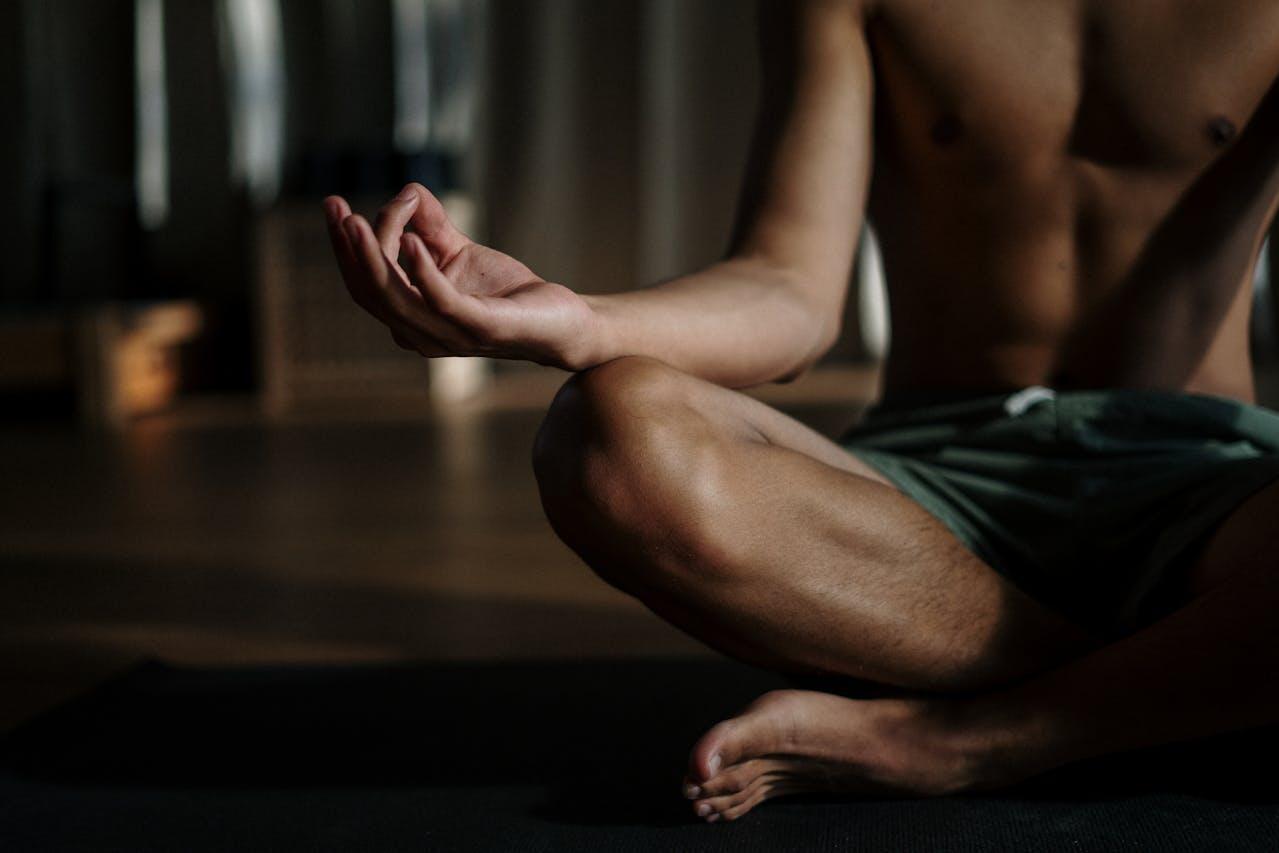
Tip #7: Establish a Calming Ritual Before Bedtime
An evening ritual allows your body and mind to gradually transition into a state of rest. It can include:
- Quiet reading
- Breathing or heart coherence exercises
- Gentle relaxation or short meditation
🔦 Also remember to dim the lights about an hour beforegoing to bed to prepare yourself for sleep and create a calming routine. This sends a clear signal to your brain that it's time to slow down.
Tip #8: Go to Sleep at the First Signs of Tiredness
Yawning, heavy eyelids, loss of concentration... These are signals your body sends you to say, “It's time to sleep.” If you ignore them, you risk missing your window of opportunity to fall asleep (or the sleep train, as my mother used to say when I was a child) and having to wait for the next cycle.
⚠️ If you can't fall asleep after 20 minutes, get up. Doing something else that is calm outside of bed helps you avoid associating your bed with insomnia.
To sleep well, adopt a regular routine: go to bed and get up at set times, even on weekends. Create a soothing bedtime ritual (dim lights, reading, breathing) and go to sleep as soon as you feel tired. These habits strengthen your biological clock and promote restful sleep.
To improve your memory, take our quiz and discover your learning style!
Try Relaxation Techniques to Fall Asleep Faster
Being mindful of your emotions, how tired you are, when you study best, and your overall well-being is just as important as getting a good night's sleep. According to a study by Tang et al.11, meditation can reduce cortisol levels.
It goes without saying that this rest will help you improve your concentration. According to a study by the University of Illinois at Chicago, meditation improves students' knowledge retention during class.12
When your mind is restless, it's hard to fall asleep. Fortunately, there are some simple and accessible relaxation techniques that can calm the nervous system, quiet intrusive thoughts, and naturally prepare you for sleep.
Tip #9: Do Simple and Effective Breathing Exercises
Breathing is a powerful and immediate tool for slowing the heart rate, reducing stress, and preparing the body for sleep.
The 4-7-8 Method13
Popularized by Dr. Andrew Weil, this technique consists of:
- Breathing in for 4 seconds
- Holding your breath for 7 seconds
- Breathing out slowly for 8 seconds
Repeat 4 to 5 times. This practice activates the parasympathetic nervous system, promoting deep relaxation.
Cardiac Coherence
This involves breathing at a regular rhythm, generally 6 breaths per minute (5 seconds to inhale, 5 seconds to exhale). Practiced for 5 minutes, it reduces cortisol (stress hormone) levels and improves sleep quality.
These exercises can be done in bed, in a quiet place, with your eyes closed, just before going to sleep to help improve the quality of your sleep.
Try Relaxation and Meditation Apps to Help You
Here are some of the best relaxation and meditation apps we've tested, but you can also check out the list of apps recommended by the American Psychiatric Association.
| Application Name | Platforms | Offline Availability | Functions | Price |
|---|---|---|---|---|
| Headspace | PC, iOS, Mobile | Yes | Meditation and ambient sounds | Free for the first 14 days then $69.99/year |
| Calm | PC, iOS, Mobile | Yes, sessions must be recorded in advance | Meditation and ambient sounds | Limited free version or $69.99/year |
| Balance | PC, iOS, Mobile | Yes, sessions must be recorded or listened to in advance | Meditation | First year free, then $11.99/month |
| Endel | PC, iOS, Mobile | Yes | Ambient noises | Limited free version or $7.49/month |
Balance
Balance offers specific meditation sessions to help you relax, boost your motivation, focus, or cultivate positivity.

What sets this app apart are its immersive sessions that use your phone's vibrations to help you focus.
The Balance app offers several options for certain meditation sessions, such as the choice of meditating with or without a coach.
In addition to these options, each session is designed to help you develop certain skills: awareness, body scan, breathing, kindness, and visualization.
🏆 Note that the Balance app won Google's Best App award in 2021.
Headspace
This colorfully designed app offers a variety of coaching sessions in areas such as mindful eating, dealing with debt, and even setting priorities.
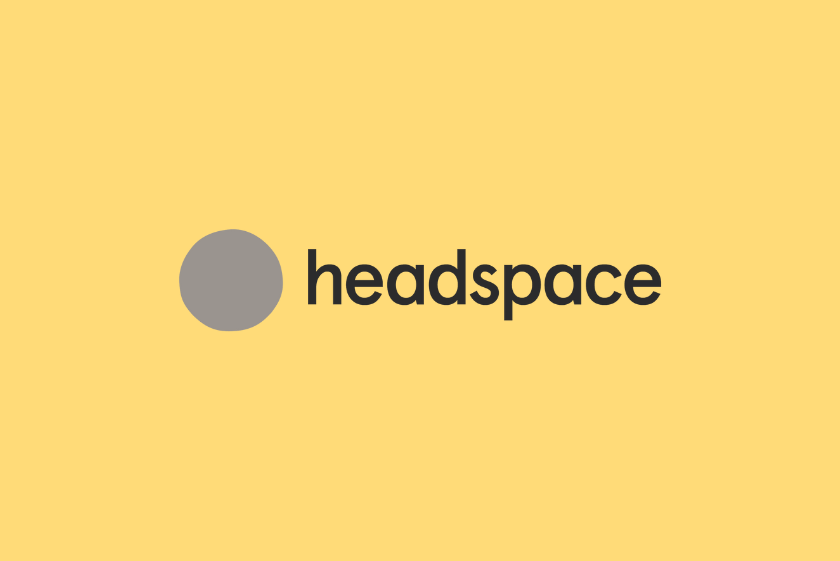
It even offers coaching from Olympic athletes!
A selection of sleepcasts (podcasts for sleeping) with a Star Wars theme is also available. These sessions last 45 minutes and allow you to relax.
As with Balance, some sessions have an immersive aspect thanks to images and vibrations from your phone. You can find free meditation and coaching videos on the Headspace blog and YouTube channel. A special offer is available for students at certain universities. Contact Headspace directly to find out if you are eligible.
Calm
This app offers soundscapes and meditation sessions tailored to your mood. The latest collaboration with Lebron James is one of the many options available.
Calm also offers playlists to accompany your reading sessions, relaxation sessions, etc. This app is on Apple's list of the best apps of 2017, but at Superprof, we prefer the minimalism of Endel or Balance.
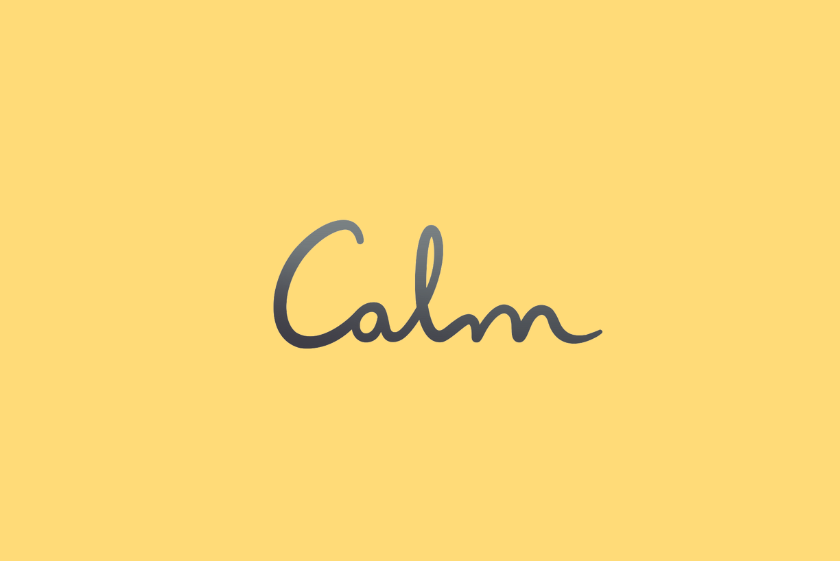
We find Calm's options to be quite limited. Endel offers more soundscapes and content in its free version.
Endel
This app has been designed to support you in your daily activities with sounds that have been proven effective by neuroscience and that take into account your circadian rhythm (and more).

It used personal data such as the user's location, weather, and heart rate.
What's really interesting is that when you open it, it immediately offers you a sound that matches your activity.
Based on your behavior, the app will know if you need motivation after a meal, relaxation in the evening, or help concentrating. Endel allows you to block out noise and promotes concentration and mindfulness.
Tip #10: Listen to Relaxing Music or Sounds
Sound has a direct effect on the nervous system and can make it easier to fall asleep. The right rhythm, tone, or soothing atmosphere can lower your level of mental arousal.
Here are a few examples to try:
- White noise (fan, rain, waves, breathing, etc.) masks disruptive sounds and stabilizes attention.
- Soft music: piano, acoustic guitar, minimalist ambient music, etc., ideally below 60 beats per minute.
- Nature sounds: forest, stream, fireplace, etc. These promote relaxation through association.
Platforms such as Spotify and YouTube, and apps such as Calm and Endel, offer playlists or relaxing sounds specially designed for sleep.
To calm your mind before going to sleep, try some simple relaxation techniques: practice 4-7-8 breathing or cardiac coherence to slow down your heart rate and reduce stress. You can also listen to soothing sounds (white noise, soft music, nature sounds) to help you fall asleep more quickly and peacefully.
Sources
- Walker, M., 2008. Sleep-Dependent Memory Processing. Harvard Review of Psychiatry , [online] 16(5), pp.287-298. [article] Available at: <https://journals.lww.com/hrpjournal/Abstract/2008/09000/Sleep_Dependent_Memory_Processing.3.aspx> [Accessed 17 August 2022].
- Walker, M. P., & Stickgold, R., 2006. Sleep, memory, and plasticity. Annual Review of Psychology, 57, 139–166. [article] Available at: <https://walkerlab.berkeley.edu/reprints/Walker%26Stickgold_AnnRevPsych_2006.pdf> [Accessed 8 August 2025]
- Diekelmann, S., & Born, J., 2010. The memory function of sleep. Nature Reviews Neuroscience, 11(2), 114–126. [article] Available at: <https://www.researchgate.net/publication/40834254_Diekelmann_S_Born_J_The_memory_function_of_sleep_Nat_Rev_Neurosci_11_114-126> [Accessed 8 August 2025]
- Rasch, B., & Born, J., 2013. About sleep's role in memory. Physiological Reviews, 93(2), 681–766. [article] Available at: <https://www.researchgate.net/publication/236186412_About_Sleep's_Role_in_Memory> [Accessed 8 August 2025]
- Lally, P., van Jaarsveld, C., Potts, H. and Wardle, J., 2009. How are habits formed: Modelling habit formation in the real world. European Journal of Social Psychology , [online] 40(6), pp.998-1009. Available at: <http://repositorio.ispa.pt/bitstream/10400.12/3364/1/IJSP_998-1009.pdf> [Accessed 17 August 2022].
- Binks, H., Vincent, G. E., Gupta, C. C., Irwin, C., Rigney, G., & Robinson, S. (2020). The Relationship between Nutrition and Sleep: A Review. Nutrients, 12(4), 936. [article] Available at: <https://doi.org/10.3390/nu12040936> [Accessed 6 August 2025]
- Kline, C. E., & al., 2025. Physical activity and sleep: What do we know? npj Biological Timing and Sleep, 2(1). [article] Available at: <https://www.nature.com/articles/s44323-024-00018-w> [Accessed 6 August 2025]
- Harvard Health Publishing, 2012. Blue light has a dark side. Harvard Medical School. [article] Available at: <https://www.health.harvard.edu/staying-healthy/blue-light-has-a-dark-side> [Accessed 6 August 2025]
- Dr. Matt Walker, 2022. Optimising your Sleep . [podcast] The Matt Walker Podcast. Available at: <https://themattwalkerpodcast.buzzsprout.com/1821163/10897112-25-optimising-your-sleep> [Accessed 17 August 2022].
- Czeisler, C. A., & Gooley, J. J., 2007. Sleep and circadian rhythms in humans. Cold Spring Harbor Symposia on Quantitative Biology, 72, 579–597. [article] Available at: <https://doi.org/10.1101/sqb.2007.72.064> [Accessed 8 August 2025]
- Tang, Y., Ma, Y., Wang, J., Fan, Y., Feng, S., Lu, Q., Yu, Q., Sui, D., Rothbart, M., Fan, M. and Posner, M., 2007. Short-term meditation training improves attention and self-regulation. Proceedings of the National Academy of Sciences , [online] 104(43), pp.17152-17156. Available at: <https://www.pnas.org/doi/full/10.1073/pnas.0707678104> [Accessed 17 August 2022].
- Ramsburg, J. and Youmans, R., 2013. Meditation in the Higher-Education Classroom: Meditation Training Improves Student Knowledge Retention during Lectures. Mindfulness , [online] 5(4), pp.431-441. Available at: <https://www.researchgate.net/publication/257795392_Meditation_in_the_Higher-Education_Classroom_Meditation_Training_Improves_Student_Knowledge_Retention_during_Lectures> [Accessed 17 August 2022].
- Weil, A., 2011. Breathing: The Master Key to Self Healing [Audio CD]. Sounds True.
- Laborde, S., Mosley, E., & Thayer, J. F., 2017. Heart Rate Variability and Cardiac Vagal Tone in Psychophysiological Research – Recommendations for Experiment Planning, Data Analysis, and Data Reporting. Frontiers in Psychology, 8, 213. [article] Available at: <https://doi.org/10.3389/fpsyg.2017.00213> [Accessed 8 August 2025]
Your tutor is waiting for you on Superprof!
Want to give it a try?
Let our experts impress you!
Summarize with AI:

